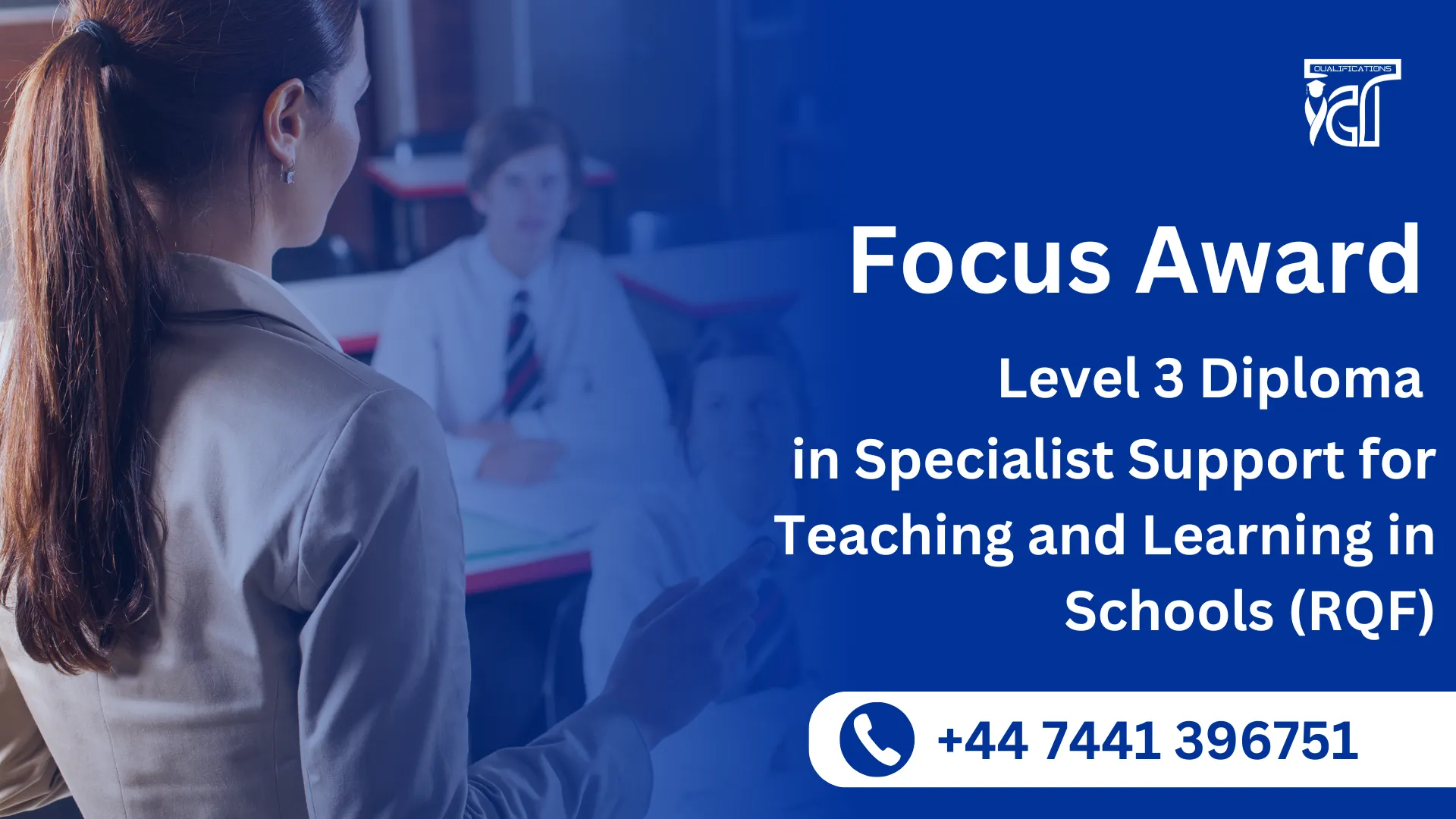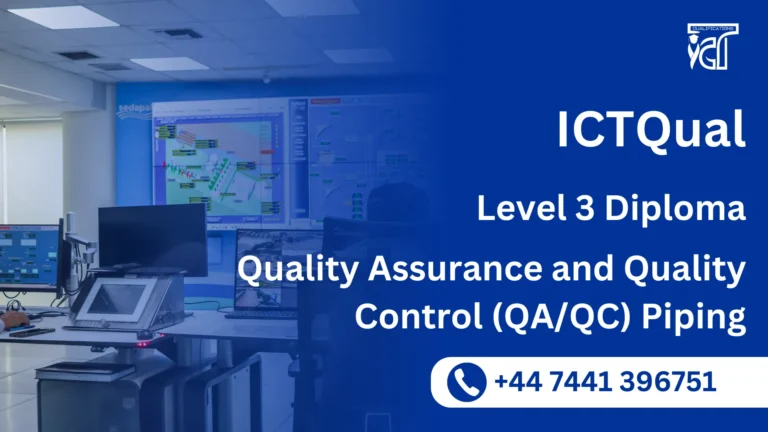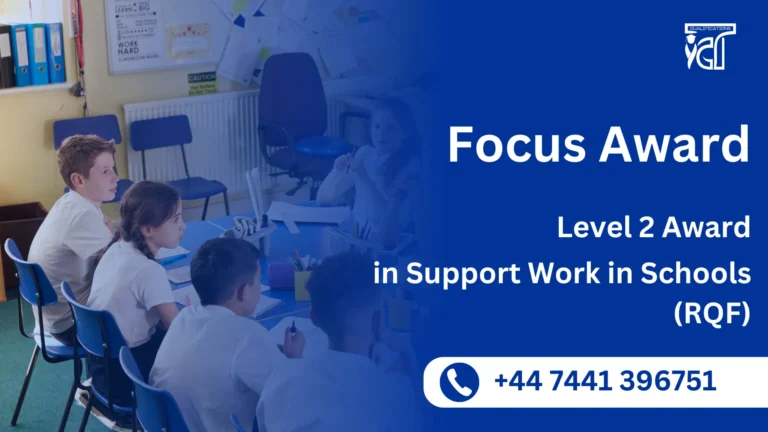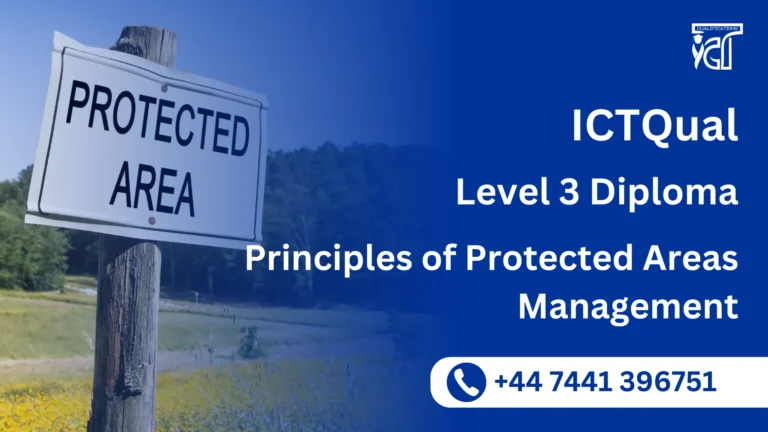Are you passionate about supporting students and contributing to the success of schools? The Focus Awards Level 3 Diploma in Specialist Support for Teaching and Learning in Schools (RQF) is the perfect qualification to help you advance in the education sector. This diploma provides you with the essential skills and knowledge needed to make a significant impact on student learning and development.
Whether you’re already working as a teaching assistant or looking to start your career in education, this course will equip you with the expertise required to support teachers and students effectively in a school environment. With the qualification being regulated by Ofqual, it is recognized and respected across the UK, ensuring you gain the skills needed to succeed in a variety of educational roles.
The Focus Awards Level 3 Diploma in Specialist Support for Teaching and Learning in Schools (RQF) is a comprehensive qualification aimed at individuals working or aspiring to work in a supporting role within the education sector. This diploma is designed for those who wish to pursue a career in educational support, offering the knowledge and skills necessary to support teaching and learning in schools.
The course covers a range of topics, including child development, inclusive education, classroom management, and supporting learners with special educational needs (SEN). Upon completion, you will be equipped with the tools to effectively support teachers and enhance students’ educational experiences, fostering a positive learning environment.
The Focus Awards Level 3 Diploma in Specialist Support for Teaching and Learning in Schools (RQF) is the ideal qualification for anyone seeking to make a meaningful difference in the education sector. Whether you are new to the profession or looking to enhance your skills, this diploma equips you with the knowledge and experience necessary to support both students and teachers in delivering high-quality education. With this qualification, you will be well-positioned to embark on a rewarding career in education, making a lasting impact on student outcomes and fostering a positive learning environment.
Focus Awards Level 3 Diploma in Specialist Support for Teaching and Learning in Schools (RQF)
The Focus Awards Level 3 Diploma in Specialist Support for Teaching and Learning in Schools (RQF) qualification, learners must complete all mandatory units totalling 44 credits.
| Sr# | Unit Title |
|---|---|
| 1 | Principles of Leadership in Energy and Environmental Design |
| 2 | Sustainable Building Design and Construction Practices |
| 3 | Energy Efficiency and Renewable Energy Integration |
| 4 | Environmental Impact Assessment and Compliance |
| 5 | Sustainable Urban Development and Smart Cities |
| 6 | Waste Management and Circular Economy Strategies |
| 7 | Corporate Sustainability and Ethical Leadership |
GLH (Guided Learning Hours) and TQT (Total Qualification Time) are terms commonly used in vocational qualifications to help define the amount of time a learner is expected to spend on their studies.
1. GLH (Guided Learning Hours)
GLH refers to the number of hours a learner spends being directly taught, supervised, or supported during their course. This includes the time spent in activities such as:
- Classroom instruction
- Practical workshops
- One-on-one tutoring or mentoring sessions
- Online learning sessions with tutor support
In other words, GLH represents the time that learners are actively engaged with their instructors or learning activities.
2. TQT (Total Qualification Time)
TQT represents the total amount of time a learner is expected to invest in completing a qualification, including:
- GLH (Guided Learning Hours): Time spent on direct learning, as explained above.
- Self-Directed Learning: This includes time spent on independent study, research, assignment completion, preparation for exams, and any other work the learner does outside of direct teaching hours.
TQT is a broader measure that includes all the time required to achieve the qualification. It helps learners and employers understand the overall commitment required for the qualification.
Key Differences Between GLH and TQT:
- GLH focuses on direct learning with guidance or supervision.
- TQT includes GLH as well as independent study time and other learning-related activities.
Example:
If a qualification has a TQT of 600 hours and a GLH of 250 hours, it means the learner should spend 250 hours in direct learning (classroom, online, or tutor-led sessions) and 350 hours on independent study or research.
Learning Outcomes for Focus Awards Level 3 Diploma in Specialist Support for Teaching and Learning in Schools (RQF):
Based on the study units provided, here is a detailed breakdown of the learning outcomes aligned with each unit in the Focus Awards Level 3 Diploma in Specialist Support for Teaching and Learning in Schools (RQF):
Communication and Professional Relationships with Children, Young People, and Adults
- Outcome: Develop effective communication strategies to build positive relationships with children, young people, and adults in a school setting, ensuring collaboration and support for learning.
Schools as Organisations
- Outcome: Understand the structure, policies, and procedures of schools as organizations, and how they operate within the educational and regulatory framework.
Support Learning Activities
- Outcome: Learn how to assist teachers with planning and delivering activities that engage children and young people, supporting their learning and development effectively.
Promote Children and Young People’s Positive Behaviour
- Outcome: Identify strategies and approaches for encouraging positive behavior in students, promoting a safe and productive learning environment.
Develop Professional Relationships with Children, Young People, and Adults
- Outcome: Foster professional relationships with children, young people, and colleagues to support the educational and emotional well-being of learners.
Promote Equality, Diversity, and Inclusion in Work with Children and Young People
- Outcome: Apply inclusive practices to ensure all students, regardless of background or ability, are provided equal opportunities to learn and succeed.
Support Assessment for Learning
- Outcome: Understand how to assist with assessments that inform teaching and learning, helping teachers monitor progress and adapt strategies.
Engage in Personal Development in Health, Social Care, or Children’s and Young People’s Settings
- Outcome: Commit to continuous personal and professional development, enhancing your knowledge and skills to better support children and young people.
Support Children and Young People’s Health and Safety
- Outcome: Gain a comprehensive understanding of how to maintain a safe learning environment by supporting health and safety policies in schools.
Understand Child and Young Person Development
- Outcome: Understand the developmental stages of children and young people, enabling you to tailor your support to meet their unique learning needs.
Understand How to Safeguard the Well-being of Children and Young People
- Outcome: Understand safeguarding principles and how to protect children and young people from harm, abuse, or neglect.
Group A: Specialist Learning Units
Plan and Deliver Learning Activities under the Direction of a Teacher
- Outcome: Develop skills to assist in planning, preparing, and delivering engaging learning activities under the teacher’s guidance.
Support Literacy Development
- Outcome: Understand strategies to support the development of literacy skills, helping children and young people become proficient in reading, writing, and communication.
Support Numeracy Development
- Outcome: Assist in promoting numeracy skills, providing students with the tools needed to understand and apply mathematical concepts.
Support Teaching and Learning in a Curriculum Area
- Outcome: Learn how to support specific curriculum areas, applying subject knowledge to enhance student learning and achievement.
Support Delivery of the 14–19 Curriculum
- Outcome: Gain expertise in supporting the delivery of education for students aged 14-19, ensuring relevant and effective learning opportunities.
Provide Literacy and Numeracy Support
- Outcome: Assist in providing targeted literacy and numeracy support for learners who may struggle with foundational academic skills.
Support Gifted and Talented Learners
- Outcome: Learn how to support students who are excelling academically, ensuring they are challenged and engaged to reach their full potential.
Support Children’s Speech, Language, and Communication
- Outcome: Support children’s language and communication skills development, ensuring learners can express themselves effectively.
Group B: Bilingual Learning Units
Support Bilingual Learners
- Outcome: Develop the skills to support bilingual students in their language development, ensuring they have equal opportunities to succeed academically.
Provide Bilingual Support for Teaching and Learning
- Outcome: Assist teachers in providing tailored educational support to bilingual learners, helping them engage with the curriculum more effectively.
Group C: Special Educational Needs (SEN) Units
Support Disabled Children and Young People and Those with Special Educational Needs
- Outcome: Acquire strategies to support learners with physical disabilities, developmental delays, and other special educational needs, ensuring inclusion in the learning environment.
Support Children and Young People with Behaviour, Emotional, and Social Development Needs
- Outcome: Learn techniques to support students who have behavioral, emotional, or social development needs, providing a nurturing environment for their growth.
Support Learners with Cognition and Learning Needs
- Outcome: Develop skills to support learners with cognitive learning difficulties, ensuring they receive appropriate resources and assistance.
Support Learners with Communication and Interaction Needs
- Outcome: Understand how to help learners who face challenges in communication and interaction, supporting their social integration and academic achievement.
Support Learners with Sensory and/or Physical Needs
- Outcome: Learn how to support students with sensory impairments or physical disabilities, providing the right tools and environment for their learning.
Support Individuals to Meet Personal Care Needs
- Outcome: Gain the skills to assist students with their personal care needs, ensuring they feel safe and supported in the school setting.
Group D: Life Skills and Transition Units
Support Children and Young People During Transitions in Their Lives
- Outcome: Learn strategies to help children and young people navigate transitions in their educational or personal lives, ensuring smooth adjustments.
Develop Interviewing Skills for Work with Children and Young People
- Outcome: Gain interviewing techniques to effectively communicate with children and young people, ensuring their views and needs are considered.
Facilitate the Learning and Development of Children and Young People Through Mentoring
- Outcome: Develop the skills needed to mentor children and young people, helping them navigate educational challenges and personal growth.
Improve the Attendance of Children and Young People in Statutory Education
- Outcome: Understand strategies for improving student attendance and reducing truancy, ensuring students can benefit fully from their education.
Promote the Well-being and Resilience of Children and Young People
- Outcome: Learn to encourage well-being and resilience in children and young people, supporting their emotional and psychological development.
Provide Information and Advice to Children and Young People
- Outcome: Support children and young people by providing accurate, age-appropriate information and advice on a range of topics.
Support Children and Young People to Achieve Their Education Potential
- Outcome: Help students reach their educational potential by providing individualized support and motivation.
Support Children and Young People to Make Positive Changes in Their Lives
- Outcome: Develop strategies to support children and young people in making positive life changes, promoting growth and development.
Support Young People in Relation to Sexual Health and Risk of Pregnancy
- Outcome: Provide information and guidance to young people about sexual health, encouraging responsible behavior and decision-making.
Support Young People to Develop, Implement, and Review a Plan of Action
- Outcome: Learn how to work with young people to create, implement, and assess personalized plans of action, supporting their personal development.
Support Young People Who Are Socially Excluded or Excluded from School
- Outcome: Develop strategies to support socially excluded or school-excluded young people, encouraging re-integration and successful learning outcomes.
Group E: Administrative and Supportive Role
Assist in the Administration of Medication
- Outcome: Gain skills to assist with the administration of medication, ensuring the health and safety of students with medical needs.
Invigilate Tests and Examinations
- Outcome: Understand the roles and responsibilities involved in invigilating exams, ensuring fairness and security during assessments.
Lead an Extra-Curricular Activity
- Outcome: Develop the skills to organize and lead extra-curricular activities, fostering students’ personal and social development.
Maintain Learner Records
- Outcome: Learn how to maintain accurate and confidential records on learners, ensuring compliance with school policies.
Benefits of the Focus Awards Level 3 Diploma in Specialist Support for Teaching and Learning in Schools (RQF)
The Focus Awards Level 3 Diploma in Specialist Support for Teaching and Learning in Schools (RQF) offers a wide array of benefits for individuals looking to build or advance their career in the education sector. This qualification is specifically designed to provide you with the practical skills and knowledge needed to effectively support teachers and students in a variety of school settings.
Here are some key benefits of undertaking this qualification:
1. Comprehensive Skill Development
The course covers a wide range of units, helping learners develop a diverse skill set necessary for supporting children and young people in the educational environment. From communication and professional relationships to safeguarding and promoting positive behavior, you will gain essential knowledge for enhancing the learning experience.
2. Recognition and Credibility
This diploma is regulated by Ofqual, which means it meets high standards of quality and is recognized across the UK and internationally. This official accreditation ensures that the qualification is respected by educational institutions and employers alike.
3. Career Advancement
Upon completion of the diploma, you’ll be well-equipped to work in a variety of school-based roles, such as a teaching assistant, learning support assistant, or classroom facilitator. It provides a solid foundation for those looking to progress in the education sector, especially in positions that involve directly working with children, young people, or teaching professionals.
4. Specialized Knowledge for Supporting Diverse Learners
The course covers key areas such as supporting students with special educational needs (SEN), promoting equality and diversity, and assisting with literacy and numeracy development. With this knowledge, you’ll be able to support a diverse range of learners, including those with emotional, social, or behavioral challenges, as well as bilingual or gifted students.
5. Hands-On, Practical Learning
The course offers a practical, hands-on approach, ensuring that learners acquire the skills needed for real-world teaching environments. Whether it’s planning and delivering lessons, managing classroom behavior, or supporting health and safety, the qualification focuses on equipping you with the tools necessary for daily tasks in educational settings.
6. Improved Job Prospects
Having this diploma on your CV significantly boosts your employability. Many schools and educational institutions require support staff with specialized training, and this qualification meets that need. Whether you are looking to enter the teaching profession or move into more specialized roles, this qualification is a great asset.
7. Increased Confidence in the Workplace
With a deeper understanding of your role in supporting the teaching and learning process, you’ll approach your daily responsibilities with increased confidence. This can also lead to higher job satisfaction and better collaboration with teaching staff, parents, and the students you support.
8. Personal and Professional Development
The diploma encourages continuous professional development by introducing you to best practices in educational support and child development. You’ll not only enhance your knowledge but also improve your problem-solving, communication, and leadership skills—valuable assets for both personal and career growth.
9. Flexible and Accessible Learning
The Focus Awards Level 3 Diploma in Specialist Support for Teaching and Learning in Schools is designed to be flexible, allowing learners to balance their studies with other commitments. Whether you choose to study full-time or part-time, this qualification can fit around your personal schedule.
10. Eligibility for Further Education
Upon completion of the diploma, you’ll have the foundation needed to pursue higher qualifications in education or special needs support. If you are looking to advance your career even further, this qualification can be a stepping stone to additional certifications or roles in teaching, school management, or educational psychology.
Best Fit for the ICTQual Level 6 Diploma in Leadership in Energy, Environmental Design, and Sustainability – LEEDS
The ICTQual Level 6 Diploma in Leadership in Energy, Environmental Design, and Sustainability – LEEDS is tailored for professionals who aspire to take a leadership role in the field of sustainability, energy management, and environmental design. This advanced qualification is perfect for individuals looking to drive change within organizations or industries focused on creating sustainable, energy-efficient environments. Below are the key groups who would benefit the most from this course:
1. Energy Managers and Sustainability Leaders
Energy managers responsible for overseeing energy efficiency programs and sustainability strategies in organizations will find this course invaluable. The knowledge and leadership skills gained will allow them to drive energy management practices, integrate sustainable design principles into projects, and lead initiatives that reduce environmental footprints.
2. Construction and Building Professionals
Construction managers, architects, and engineers involved in building design and development will benefit greatly from this course. It will provide them with the advanced knowledge needed to incorporate sustainable building practices, energy-efficient technologies, and environmentally conscious design strategies into construction projects. This course is an essential step for those seeking to become leaders in the green building and sustainable construction sectors.
3. Environmental Consultants
Environmental consultants who guide organizations toward sustainability practices will find this diploma an excellent way to enhance their credentials. The program equips them with the skills needed to advise clients on how to incorporate energy-efficient designs and environmental policies into their operations, helping them stay ahead of industry trends and regulations.
4. Corporate Sustainability Officers
Sustainability officers or managers working in corporate environments will benefit from this diploma as it provides a comprehensive understanding of how to lead sustainability initiatives within organizations. This qualification will help them design and implement corporate sustainability strategies that align with global environmental goals while improving organizational performance.
5. Urban Planners and Policy Makers
Urban planners, developers, and policy makers involved in designing sustainable communities and smart cities can use this diploma to refine their skills in environmental design and energy management. The course will empower them to create policies and strategies that promote sustainable urban development and ensure environmental responsibility in city planning and infrastructure.
6. Aspiring Leaders in Sustainability
This course is ideal for individuals looking to step into leadership positions within the sustainability sector. Whether you are currently working in energy management, environmental design, or another related field, this diploma will provide you with the leadership skills necessary to manage large-scale sustainability projects and influence strategic decisions in organizations.
7. Facilities and Operations Managers
Facilities managers responsible for overseeing the maintenance and operations of buildings will find this diploma useful in learning how to implement energy-efficient systems and sustainable practices within their facilities. The course will teach them how to lead initiatives that reduce energy consumption, improve waste management, and enhance environmental performance in day-to-day building operations.
8. Renewable Energy Professionals
Professionals working in renewable energy sectors will benefit from the advanced knowledge in sustainable energy and environmental design provided by this diploma. It will allow them to take leadership roles in designing, implementing, and managing energy-efficient projects and renewable energy systems in various sectors.
9. Government and Non-Governmental Organization (NGO) Professionals
For individuals working in government roles or NGOs focused on environmental protection and sustainability, this course will provide them with the expertise needed to implement and influence policies on energy efficiency, environmental sustainability, and green building standards. It equips them with the tools to advocate for sustainable practices on a larger scale and contribute to policy development.
10. Environmental Advocates and Researchers
Environmental advocates, researchers, or professionals in environmental science and policy will benefit from this course by gaining a deeper understanding of energy management, sustainable design, and environmental policies. It will give them the tools to conduct more informed research, advocate for effective green initiatives, and engage with communities and stakeholders on sustainability matters.
11. Entrepreneurs and Business Owners
Entrepreneurs and business owners aiming to launch sustainability-driven ventures or develop green technology solutions can use this course to gain a strong understanding of the principles behind energy efficiency and environmental sustainability. It will help them develop innovative products or services that contribute to a greener and more sustainable future.
Entry Requirements
Register Now
Qualification Process
Qualification Process for the Focus Awards Level 3 Diploma in Specialist Support for Teaching and Learning in Schools (RQF)
- Self-Assessment:
Begin by evaluating your eligibility to ensure you meet the qualification requirements, including work experience, knowledge, and language proficiency. - Registration:
Complete your registration by submitting the required documents, including a scanned copy of a valid ID, and paying the registration fee. - Induction:
An assessor will conduct an induction to confirm your eligibility for the course and explain the evidence requirements. If you do not meet the criteria, your registration will be canceled, and the fee will be refunded. - Assignmnets & Evidence Submission:
Provide all assignmnets and the necessary evidence based on the assessment criteria outlined in the course. If you are unsure of the required evidence, consult with the assessor for guidance on the type and nature of evidence needed. - Feedback and Revision:
The assessor will review your submitted evidence and provide feedback. Evidence that meets the criteria will be marked as “Criteria Met,” while any gaps will be identified. You will be asked to revise and resubmit if needed. - Competence Evidence:
Submit final evidence demonstrating that all learning outcomes have been met. This evidence will be marked as “Criteria Met” by the assessor once it is satisfactory. - Internal Quality Assurance (IQA):
The Internal Quality Assurance Verifier (IQA) will review your evidence to ensure consistency, quality, and compliance with standards. - External Verification:
The IQA will submit your portfolio to Focus Award External Quality Assurance Verifiers (EQA) for final confirmation. The EQA may contact you directly to verify the authenticity of your evidence. - Certification:
Upon successful completion of all checks, FOCUS AWARD will issue your official certificate, confirming that you have attained the Focus Awards Level 3 Diploma in Specialist Support for Teaching and Learning in Schools (RQF)







